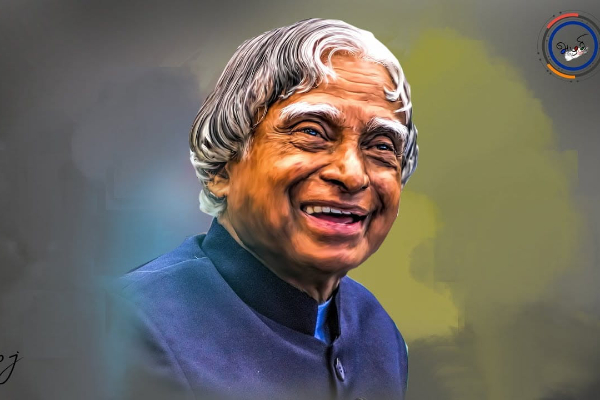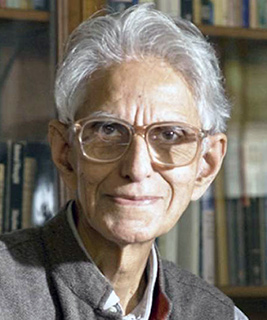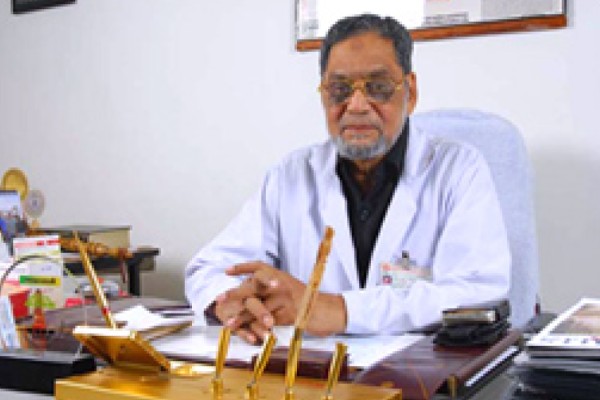_(3).webp)
In independent India, Muslims served in various fields, including scientific research. Be it medical science or space science, the contribution of Muslims is etched on the pages of history. After the partition, a majority of educated Muslims had left for Pakistan. Still, despite this, due to a free environment and opportunities, Muslims joined the national movement to make India a scientific power.
Here is a list of ten names who have remarkable achievements to their credit in the field of science and technology in independent India.
Dr. APJ Abdul Kalam
Dr. Arvul Pakir Jainulabedin Abul Kalam, popularly known as Dr. A.P.J. Abul Kalam, caught national and international attention as "India's Missile Man" with the successful launch of 'Agni' from Chandipur(Orissa) on May 22, 1989. An Indian aerospace scientist and statesman who served as the president of India from 2002 to 2007.
Born in 1931 at Rameshwaram in Tamil Nadu, Dr. Abul Kalam is a DMIT (Diploma from the Madras Institute of Technology) in Aero Engineering. He was awarded a Doctor of Science (D.Sc.) degree (Honoris Causa). He was Director-in-charge of ASL-V mission at Indian Space Research Organization (ISRO) before becoming the Director of the Defense Research and Development Laboratory (DRDL), which is located in Hyderabad, in Andhra Pradesh. He is a Fellow of the Indian Academy of Sciences.

Dr. APJ Abdul Kalam
Dr. Abul Kalam is the brain behind "Agni"; the indigenously developed 17-meter-long and 75-ton multiple-stage missile with a payload of 1000 kg. Its range is anywhere between 1600 km and 2500 km. He was assisted by a 400-strong team of scientists.
Due to his team's efforts, India overcame the stipulations made by the seven Western Countries' Missile Technology Control Regime (MTCR) to deny missile technology to third-world countries.
He was appointed Advisor to the Defense Minister IN 1989 and subsequently awarded "Bharat Ratna," the highest civilian award by the Government of India.
Syed Zahoor Qasim
Dr. Zahoor Qasim is known for India's Antarctica mission. Sayed Zahoor Qasim (31 December 1926 – 20 October 2015) was an Indian marine biologist. Qasim helped lead India's exploration to Antarctica and guided the other seven expeditions from 1981 to 1988. He was a Member of the Planning Commission of India from 1991 to 1996.
.jpg)
He was the Vice Chancellor of Jamia Millia Islamia from 1989 to 1991 and an Honorary Professor of universities including Aligarh Muslim University, Madurai Kamaraj University, Anna Malai University, Indian Institute of Technology Madras, and Jamia Millia Islamia. He was awarded the highest civilian awards Padma Shri and Padma Bhushan.
Dr. Obaid Siddiqui
Dr. Obaid Siddiqui, an expert in neurobiology and genetics, was a prominent scientist of India who played an important role in the establishment of the Tata Institute of Fundamental Research’s National Center for Biological Sciences.
Obaid Siddiqi was born in 1932 in Basti district of Uttar Pradesh. He received his early education at Aligarh Muslim University where he completed his MSc and later his PhD at the University of Glasgow. He carried out his post doctoral research at the Cold Spring Harbor Laboratory, and University of Pennsylvania.

He was invited by Homi Bhabha to set up the molecular biology unit at the Tata Institute of Fundamental Research (TIFR) in Bombay in 1962. He became the founding director of the TIFR National Center for Biological Sciences in Bangalore, where he would continue his research into his final days of life. He was President of the Indian Academy of Sciences, Member, Royal Society, London, and also Member, US National Academy of Sciences, Washington. He was conferred with Padma Bhushan in 1984
Dr. Salim Ali
Known as the Bird Man of India ,Salim Moizuddin Abdul Ali, better known as Salim Ali, the bird watcher extraordinary was born on November 12, 1896. He is a recipient of the J. Paul Getty Wild Life Conservation Prize for his contributions to ornithology, the study of birds. He has won several national honors and awards as well. Surprisingly, Salim Ali has no university degree. He is a world renowned expert on weaver birds. Salim discovered Finn's Baya which was believed to have been extinct for 100 years until he discovered it in the Kumaon hills.
.jpg)
In 1941 he published 'The Book of Indian Birds' that contained lively descriptions and colored pictures of every species. It made spotting a bird easy for the layman.
In 1948 he began an ambitious project in collaboration with S. Dillon Ripley, an ornithologist of international repute, to bring out in ten volumes Handbook of the Birds of India and Pakistan. This work contains all that is known of birds of the subcontinent, their appearance, where thy are generally found, their breeding habits, migration and what remains to be studied about them. Salim Ali has travelled all over India on his bird-watching surveys. It is claimed that there is hardly a place in the country where his heavy rubber shoes have not left their mark.
Ebrahimali Abubacker Siddiq
Ebrahimali Abubacker Siddiq (born 1937) is an Indian agricultural scientist, whose research in genetics and plant breeding has helped in the development of various high-yielding rice varieties such as dwarf basmati and hybrid variety of paddy. He was honoured with the fourth-highest civilian award Padma Shri in 2011.
.jpg)
His career started at the Indian Agricultural Research Institute, as a cytogeneticist in 1968,a post he held till 1976 when he was promoted as the Senior Scientist. In 1983, he was deputed to Egypt as the Rice Breeder and in 1986, transferred to Philippines as the Professor of Genetics. The next year, he returned to India as the Project Director of the Directorate of Rice Research, Hyderabad and worked there till 1994.The next move was to Indian Council of Agricultural Research (ICAR), New Delhi as the Deputy Director General of the Crop Science Division.
In 1997 Siddiq was honored as the National Professor of ICAR and in 2002,he took charge of the Centre for DNA Fingerprinting and Diagnostics (CDFD) as the Distinguished Chair. On his retirement in 2007, he was appointed as the Adjunct Scientist at CFFD. He also holds the positions of Adjunct Professor of the University of Hyderabad, Adjunct Professor of the Indian Agricultural Research Institute (IARI) and the Honorary Professor of Biotechnology at Acharya NG Ranga Agricultural University, Hyderabad.
Seyed E. Hasnain
Seyed E. Hasnain spent several years at the Texas A&M University, U.S., and returned to India in 1987 to work as a staff scientist at the National Institute of Immunology (NII). Hasnain was appointed as the first director of Centre for DNA Fingerprinting and Diagnostics (CDFD) in February 1999. He served as the 7th vice-chancellor of University of Hyderabad from 2005 to 2011.
.jpg)
He took charge as vice-chancellor of Jamia Hamdard, New Delhi on 2 September 2016 and served the office till 2021. An invited professor at the Indian Institute of Technology, Delhi (2011–2018), he is currently serving as one of the first 5 National Science Chair of SERB at IIT, Delhi.
Sibte Hasan Zaidi
Sibte Hasan Zaidi was an Indian pathologist and toxicologist recognized for his contributions to experimental toxicology. He trained in pathology at Hammersmith Hospital in London, where he also conducted research in toxicology.Upon completing his training, Zaidi returned to India to do research in experimental toxicology.
.jpg)
His work focused on the biological effects of industrial toxins, and he participated in national and international initiatives addressing environmental and occupational health hazards. Zaidi also served on multiple committees, including those of the World Health Organization, where he provided expert advice on toxicology and public health. He was conferred Padma Shri in 1977.
Chittoor Mohammed Habeebullah
Chittoor Mohammed Habeebullah is gastroenterologist, known for his contributions to the research in the field. He was born in 1937 in Andhra Pradesh where he graduated from the Guntur Medical College in 1958. He completed his master's degree in general medicine (MD) from Andhra University and DM from the Post Graduate Institute of Medical Education and Research, Chandigarh. He started his career as an assistant professor at the Department of Gastroenterology, Osmania Medical College where he worked till 1992.
 He was promoted as the principal of the College and served till 1994. He also served as the Director, Centre for Liver Research and Diagnostics, Deccan College of Medical Sciences, Hyderabad and as the Director of Medical Education, Government of Andhra Pradesh. He was a 1997 Fellow of The National Academy of Sciences, India and had many scientific publications to his credit. A recipient of the Khwarizmi International Award in 1997, Habeebullah was honored with Padma Shri. He died on 10 July 2010.
He was promoted as the principal of the College and served till 1994. He also served as the Director, Centre for Liver Research and Diagnostics, Deccan College of Medical Sciences, Hyderabad and as the Director of Medical Education, Government of Andhra Pradesh. He was a 1997 Fellow of The National Academy of Sciences, India and had many scientific publications to his credit. A recipient of the Khwarizmi International Award in 1997, Habeebullah was honored with Padma Shri. He died on 10 July 2010.
Qamar Rehman
Qamar Rehman worked has researched on the physiological effects of nanoparticles during last four decades. He is internationally known for her work on the effects of asbestos, slate dust and other household and environmental particulate pollution and on ways to improve occupational health.
Dr. Qamar Rehman was born a year before independence into a prominent scholarly family in Shahjahanpur, UP. Despite the strict tradition of secrecy in the family, she achieved success in the field of science. Dr. Qamar Rehman is among the ten women scientists of India, and is the first Indian scientist to be awarded an honorary doctorate by the University of Rostock, Germany, the 600-year-old institution which honoured Einstein.
.jpg)
She was also awarded the prestigious Vigyan Vibhushan and Yash Bharati Awards. Under her supervision, 45 students completed their PhD research. Dr. Qamar Rehman has the honour of being on the advisory panel of the World Health Organization. She is a professor at the University of Rostock in Germany and Amity University in Lucknow.
Dr. Israr Ahmed
Dr. Israr Ahmed, Director, Center for Promotion of Science, Aligarh Muslim University (AMU), Aligarh, is a distinguished scientist. He is considered an authority on Theoretical Nuclear Physics and Quantum Scattering Theory. Besides, he has been editing the AMU's Urdu monthly 'Tahzibul Akhlaq' and Hindi monthly 'Nishant' since 1986.
.jpg)
Israr Ahmed earned a Ph.D. in Physics from AMU. He joined the AMU as a Lecturer in 1961. Since 1984 he is serving the Physics department as its Chairman.
His 48 research papers have so far been published in the international journals. A number of research scholars have been awarded M.Phil and Ph.D. under his supervision.
ALSO READ: 10 Muslim scholars who enriched India's educational field
Dr. Israr Ahmed is an associate member of the International Center for Theoretical Physics located in Trieste (Italy) headed by the late Nobel Laureate, Dr. Abdus Salam. He is a member of the New York Academy of Sciences and as well as the Indian Physics Association.
